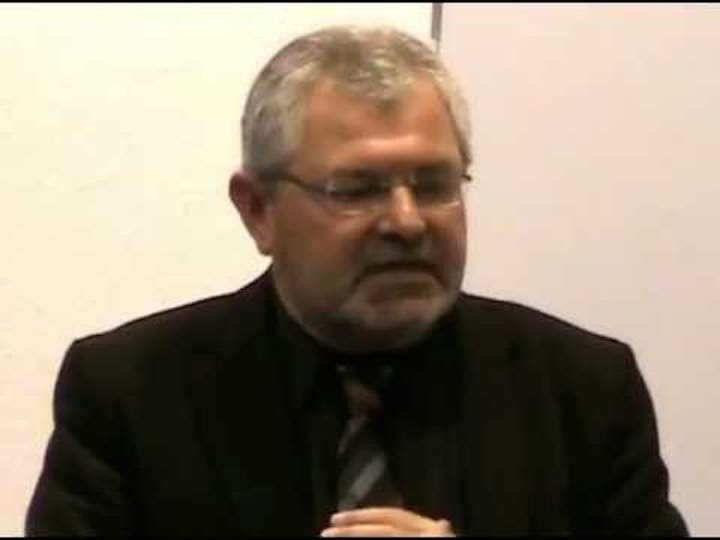 Photo from YouTube.
Photo from YouTube. The once respected academic career of UCLA historian Gabriel Piterberg has come to an apparent end, not because of his unrelenting hostility toward Israel and Zionism, but due to long-standing sexual harassment charges by two women students.
While Piterberg has denied the accusations, UCLA authorities last week capped a five-year investigation by concluding that he had violated the university’s sexual harassment policy.
As a result, Piterberg agreed to leave UCLA, forego any future employment on any University of California campus and forfeit any future emeritus status, office space and other academic privileges, the Los Angeles Times reported Sunday(3/13).
The charges against Piterberg dated back to 2013, when two female graduate students complained to UCLA authorities that the professor had harassed them over many years by making offensive sexual comments, pressing himself against their bodies and forcing his tongue into their mouths.
Piterberg has rejected all requests for media interviews.
Piterberg became a member of the UCLA history faculty in 1999. He soon became a controversial figure on campus, though not for his alleged sexual proclivities.
According to his own resume, Piterberg was born in Buenos Aires but grew up in Israel. He served in the Israeli army in the early 1980s and saw action against the forces of the Palestine Liberation Organization (PLO) in southern Lebanon.
After his army discharge, he studied and received academic degrees – all with highest honors – from Tel Aviv University in Middle East history and political science, and a Ph.D. degree from Oxford University, where his research focused on the history of the Ottoman Empire.
Subsequently he taught at England’s University of Durham and at the Ben-Gurion University of the Negev.
After arriving at UCLA, Piterberg seemed set for a bright academic career, advancing to a full professorship in 2008 and in 2013 becoming director of the Gustav von Grunebaum Center for Near Eastern Studies.
At seminars and in specialized scholarly publications Piterberg soon earned a reputation as an unrelenting critic of the creation and existence of Israel.
Until the sexual harassment charges against Piterberg became public, his fellow history professors – like most academics – were loath to criticize a colleague for his opinions, however offensive.
An exception on the UCLA campus was Judea Pearl, a professor of computer science, director of the Cognitive Systems Laboratory and considered one of the world’s foremost authorities on artificial intelligence.
He and his wife Ruth are also co-founders of the Daniel Pearl Foundation, created in memory of their son, a journalist murdered by Islamic extremists in Pakistan in 2002.
Judea Pearl has shown no reluctance to express his abhorrence of Piterberg’s views. He believes that Piterberg’s “scholarly” contributions can be summed up as “bash Israel as viciously as you can, someone might listen and take it seriously.”
Pearl added that “Piterberg belongs to a group of extreme left so-called ‘historians,’ who see their role as the re-interpretation of history to fit their political agenda.
“His agenda is to malign Zionism…which he sees as an organic part of ‘white settler colonialism,’ the 19th century effort by European powers to create societies in their own image by dispossessing the indigenous people…He even attributes Nazi origins and Nazi ideologies to most Zionist leaders.”
Asked what might have turned Piterberg from an Israeli soldier and brilliant student into a bitter foe of the Jewish state, Pearl answered that he was at a loss for an answer.
Meanwhile, the two women students, Kristen Glasgow and Nefertiti Takla, found the UCLA administration less than eager to pursue their case and in 2015 they filed a lawsuit against the University of California.
Although the two women were granted some monetary compensation and Piterberg was told to talk to students only with his office doors open, he continued in his teaching capacity.
But by 2016 campus opinion turned against Piterberg, with large student protests and a petition by 38 history professors complained that “students, staff and faculty must contend with the presence of a harasser in our midst.”
Finally, 10 years after Glasgow’s first humiliating encounter with Piterberg, she learned her harasser had lost his job. She described her reaction on learning the news to the Los Angeles Times as “I cried, I laughed, I screamed. It was 10 years and 10,000 pounds of weight off my shoulders.”























 More news and opinions than at a Shabbat dinner, right in your inbox.
More news and opinions than at a Shabbat dinner, right in your inbox.